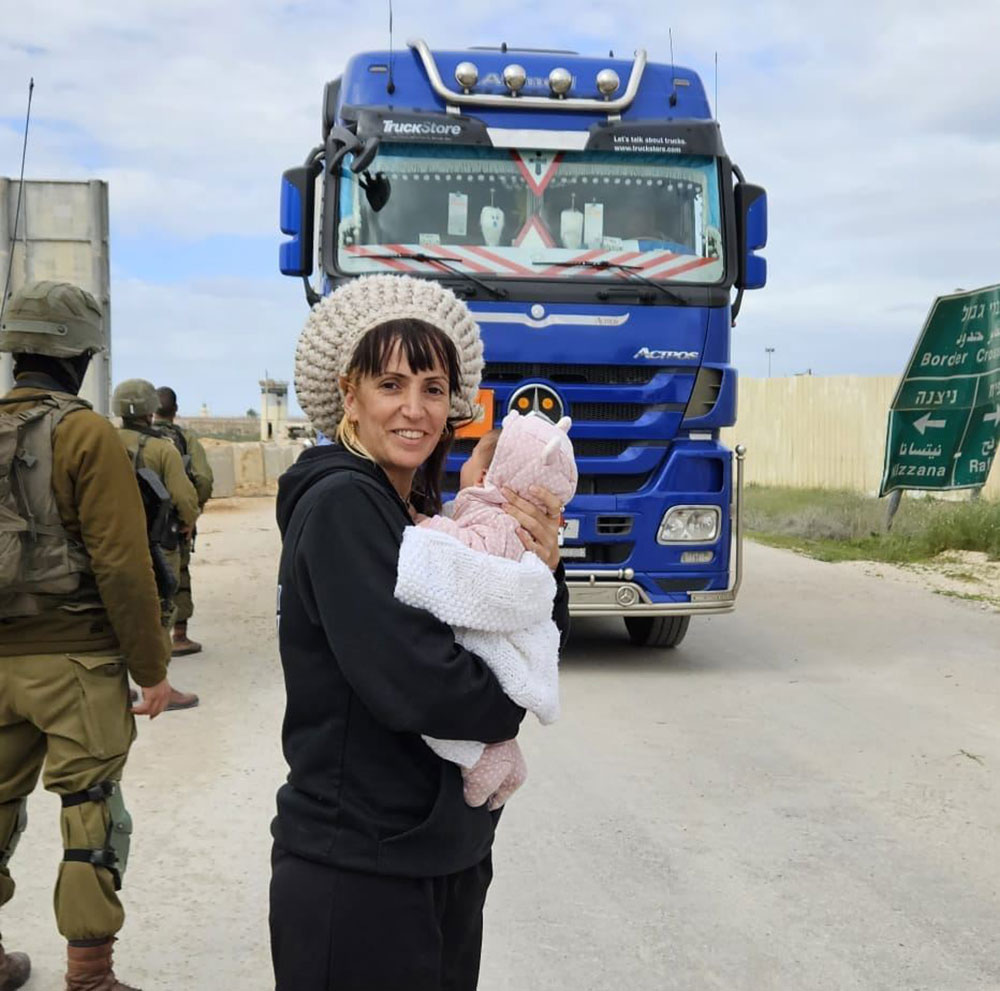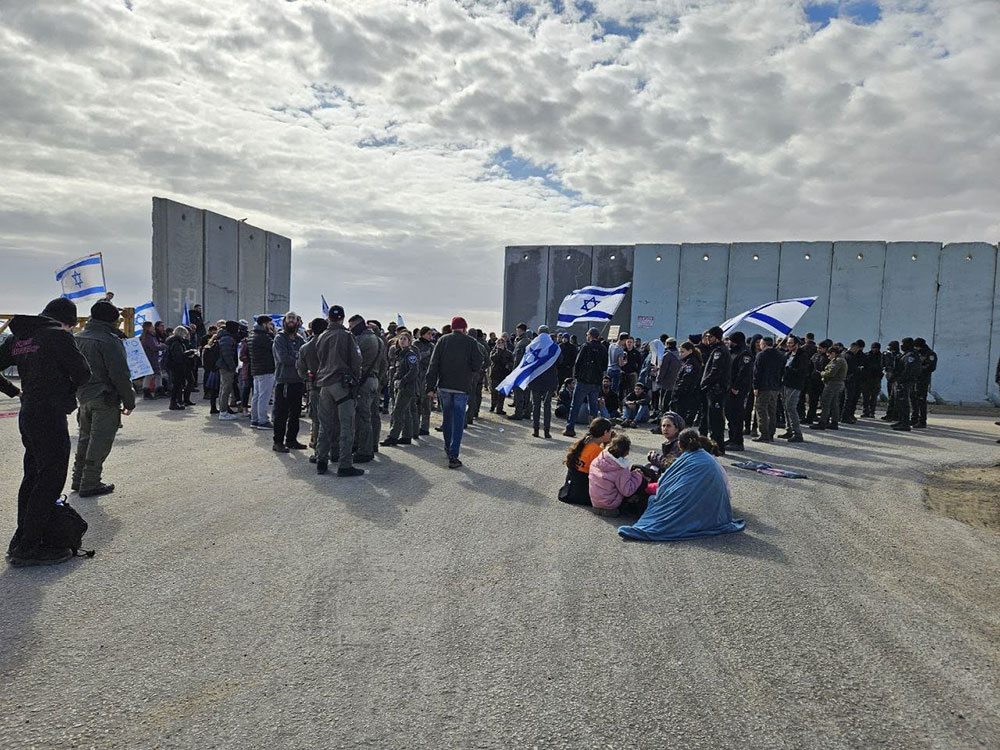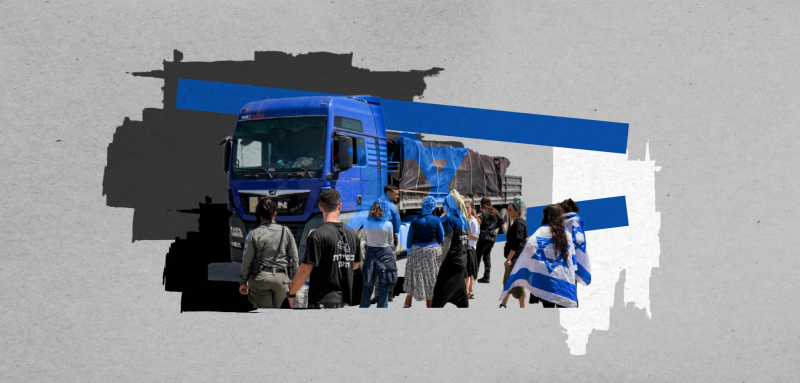Since Israeli Defense Minister Yoav Gallant uttered the infamous statement that is now seen by many as the stick that beat the first drum of war: “There will be no electricity, no food, no fuel, everything is closed. We are fighting human animals,” Israel has imposed a tight siege on the Gaza Strip.
From that moment on, Israeli ministers have continuously issued instructions to halt all forms of humanitarian aid to the devastated region. Foreign Minister Israel Katz issued orders to stop all water supplies to Gaza, followed by National Security Minister Ben-Gvir's statement: “We must stop providing them with aid. We want them to crawl to us and beg for a deal.”
Israel’s Finance Minister Bezalel Smotrich later remarked that “it might be justified and moral to starve two million Gazans.”
This form of punishment is being used by the Israeli government as a weapon against civilians, in clear violation of international and humanitarian laws.
Since October 7, Israeli ministers have continuously issued instructions to halt all forms of humanitarian aid to the devastated Gaza Strip. Israel’s Finance Minister Bezalel Smotrich even remarked that “it might be justified and moral to starve two million Gazans.” This form of punishment is being used by the Israeli government as a weapon against civilians, in clear violation of international and humanitarian laws.
It seems that a group is physically enforcing these policies at the Israeli crossings where humanitarian aid enters Gaza. The Tzav 9 (‘Order 9’) movement is the most prominent group advocating for preventing aid from reaching Gaza.
מוחים מתנועת "צו 9" חוסמים את מחסום כרם שלום - ומונעים את כניסת משאיות אספקה לרצועת עזה. בין המוחים: משפחות חטופים וחללים, אנשי מילואים משוחררים ואזרחים מפונים @pozailov1 pic.twitter.com/tzbGBIvx7K
— כאן חדשות (@kann_news) January 24, 2024
Tzav 9 includes Israeli reserve soldiers who participated in the genocidal war on Gaza. The group focuses on field operations by heading to the crossings to block trucks carrying humanitarian aid and prevent them from crossing into Gaza.
“The call to starve and forcibly displace the people of Gaza is frequently echoed in Israel, whether by the government or by influential groups, individuals, former officials, and military personnel, who see it as a means to pressure Palestinian resistance and shape what they refer to as the ‘day after’ the war,” says Antoine Shalhat, a researcher at the Palestinian Forum for Israeli Studies (MADAR), in a conversation with Raseef22.
He adds, "These voices consistently assert that sieges during wars aren’t just legitimate tactics but preferred ones—starving the enemy to death."
What is the Tzav 9 movement?
According to Israel's Ma’ariv newspaper, the Tzav 9 movement was founded by a couple, Reut and Yosef Ben Haim, two Israelis living in the town of Netivot, located in the Negev (Naqab) region of southern Israel.
Tzav 9, whose name translates to “Order 9” in Hebrew, includes Israeli reserve soldiers who participated in the genocidal war on Gaza. The group focuses on field operations by heading to the crossings to block trucks carrying humanitarian aid and prevent them from crossing into Gaza.
The group was launched under the slogan "No aid until the last hostage returns." Its formation coincided with a demonstration on January 11, 2024, near the Kerem Shalom crossing, the main entry point for humanitarian aid into Gaza.
In an interview with the Israeli Maariv publication, the movement's founder mentioned that when she and her husband were heading to the Kerem Shalom crossing to stop the trucks, they realized they couldn't do it alone. So, according to her, they "recruited Israeli ‘activists’ to form a group capable of taking action and making an impact.”
The movement claims to have around 15,000 members, though its supporters believe the actual number is higher. They say an estimated 300,000 Israelis have supported or participated in activities linked to the group since its inception back in January.
Shalhat points out that Tsav 9, whose name translates to “Order 9” in Hebrew, is a nod to Tsav-8, the call-up orders Israeli military reservists receive when they are called up for duty. The name comes from Article 9 of the Reserve Forces Law in the Israeli military, which mandates urgent conscription in emergencies, reflecting the group’s roots among Israeli military reservists and settlers.
 Reut Ben Haim, the founder of Tzav 9, stands in front of an aid truck meant to enter Gaza.
Reut Ben Haim, the founder of Tzav 9, stands in front of an aid truck meant to enter Gaza.
Reut Ben Haim, the founder of Tzav 9, stands in front of an aid truck meant to enter Gaza.
A self-proclaimed activist from the group admitted in an interview with Maariv, "We are the people who fought in Gaza and now block the [humanitarian aid] trucks with our bodies. We believe no country in the world provides supplies to its enemy."
“The call to starve and forcibly displace the people of Gaza is frequently echoed in Israel, whether by the government or by influential groups, individuals, former officials, and military personnel, who see it as a means to shape what they refer to as the ‘day after’ the war. These voices consistently assert that sieges during wars aren’t just legitimate tactics but preferred ones—starving the enemy to death."
According to The Washington Post, Tsav 9 is “the lead group in a constellation of extremist organizations that have been trying to keep aid from getting to Gaza, infuriating US and Arab leaders and worsening the already grim circumstances for civilians in the Palestinian territory, where many people are facing starvation.”
Ismat Mansour, a writer and political analyst specializing in Israeli affairs, tells Raseef22 that "the Tzav 9 movement emerged from the extremist Israeli environment of incitement, hostility, and hatred for everything Palestinian, and the desire for revenge that swept Israeli society after Operation Al-Aqsa Flood."
Mansour explains that the relationship among its members is not hierarchical or rigid, but rather a horizontal relationship based on pulpit power and public platforms. One person makes a call, and others join, forming a movement.
"Despite being a loose framework with broad political lines, it is directed toward a single path—extremism. It may be difficult to control or combat because each person in the group considers themselves an essential component and symbol of the group," Mansour adds.
A self-proclaimed activist from the group admitted in an interview with Maariv: "We are the people who fought in Gaza and now block the [humanitarian aid] trucks with our bodies. We believe no country in the world provides supplies to its enemy."
According to Haaretz, after numerous demonstrations and repeated attacks carried out by the movement on the crossings, without intervention from any official authorities to stop the aggression, the Israeli military set up some roadblocks leading to the Gaza crossings. It also declared the crossings a closed military zone in an attempt to limit the flow of “right-wing protesters” attempting to block, burn, and damage the aid trucks.
However, The Washington Post reports that “some Palestinians who have been targeted say the Israeli military does little to prevent the attacks, and sometimes forces them to leave behind the offloaded shipments, a charge the IDF denies.”
The complex relationship between far-right parties and the Tzav 9 movement
"The relationship between far-right parties and this movement is compositional and complex, not organizational," says Mansour. "The parties provided the atmosphere, immunity, protection, and extreme environment for such groups, which find a haven, backup, and support from major parties, especially the extreme right."
He adds, "Most Likud Party members are now competing for the favor of these movements, racing to win their approval and votes by creating a conducive environment for their activities, overlooking accountability, and granting them immunity."
“The Tzav 9 movement emerged from the extremist Israeli environment of incitement, hostility, and hatred for everything Palestinian, and the desire for revenge that swept Israeli society after October 7."
He further explains that "such groups are an extension of larger movements, especially the religious right, which are formed legally as official movements in Israel but cannot carry out such street-level actions. As a result, a small group like Tzav 9 becomes their executive arm, carrying out their policies. The relationship is not one of patronage or rejection but a complex, interactive one."
In a report published by the Palestinian Forum for Israeli Studies (MADAR), writer Yasser Manaa pointed out that the movement has “clear, close ties with far-right parties, particularly the Religious Zionism party led by Israeli minister Itamar Ben-Gvir. The movement includes families of detainees and hostages, reservist soldiers, settlers evacuated from Gaza border settlements, and Knesset members like Zvi Sukkot from the Religious Zionism party.”
Ben-Gvir has repeatedly called for halting the entry of humanitarian aid into Gaza in line with the movement's activities. A letter of support directed to the movement and its members from Shmuel Eliyahu, the Chief Rabbi of Safed, also demonstrates the far-right's backing of the group.
 The Tzav 9 Israeli group blocks the Kerem Shalom crossing to prevent humanitarian aid from entering Gaza.
The Tzav 9 Israeli group blocks the Kerem Shalom crossing to prevent humanitarian aid from entering Gaza.
The Tzav 9 Israeli group blocks the Kerem Shalom crossing to prevent humanitarian aid from entering Gaza.
How does Netanyahu use the movement to counter calls for a ceasefire?
"The Likud party and far-right nationalist parties are working to confront internal Israeli movements opposing the war and advocating for a ceasefire and the release of Israeli hostages," Shalhat explains.
He continues, "Supporting this group strengthens support for the war and its continuation, and bolsters the Likud narrative set by Prime Minister Benjamin Netanyahu, which posits that military pressure is the only guarantee for the release of hostages."
Attacking humanitarian aid convoys and preventing their entry into Gaza constitutes a grave violation of the fundamental rules of international humanitarian law, particularly the Fourth Geneva Convention.
Mansour points out that "Netanyahu exploits these movements to escape external pressures regarding the entry of humanitarian aid, food, and medical supplies, and the calls for a ceasefire."
"But Netanyahu is starting to feel that these movements are embarrassing him with his American and European allies. He is now trying to curb their power as they attract an extremist audience that could turn against him in the future," Mansour concludes.
The US imposes sanctions
In mid-June, the Biden administration announced sanctions against the extremist Israeli group Tzav 9 for its “heinous acts” in disrupting humanitarian convoys heading to Gaza, according to The Washington Post.
US State Department spokesperson Matthew Miller held the Israeli government accountable for ensuring the safety of aid shipments and preventing interference.
“For months, individuals from Tsav 9 have repeatedly sought to thwart the delivery of humanitarian aid to Gaza, including by blockading roads, sometimes violently, along their route from Jordan to Gaza, including in the West Bank,” Miller said in a statement announcing the sanctions. “We will not tolerate acts of sabotage and violence targeting this essential humanitarian assistance.”
At the time, the movement accused the Biden administration of acting against the families of the hostages, claiming that "this aid is going directly to the terrorist organization Hamas."
In line with this, the US imposed sanctions on key leaders and activists, including Shlomo Yehezkel Hai Sarid, for his role in obstructing and attacking aid convoys.
"The Israeli government’s support for this group strengthens support for the war and its continuation, and bolsters the Likud narrative set by Prime Minister Benjamin Netanyahu, which claims that military pressure is the only guarantee for the release of hostages."
This comes after the European Union imposed sanctions on the Tzav 9 organization after the group "regularly blocked humanitarian aid trucks delivering food, water and fuel to Gaza. Tzav 9’s actions include violent protests, attacks against food trucks, and the destruction of food."
However, the sanctions have done little to stop the group’s actions. According to The Washington Post report, “the Israeli extremists often use WhatsApp groups to help track the shipments and coordinate attacks on them, turning out in groups to rip aid off the back of flatbed trucks and destroy it.
According to The Times of Israel, the US State Department began working on designating the movement as a sanctioned group after President Biden issued an executive order instructing his administration to impose sanctions on individuals and groups that "undermine peace, security, and stability in the West Bank."
Eugene Kontorovich, a legal scholar who advises members of Tzaf 9, said he “expects to see the sanctions challenged in US courts,” arguing that they infringe on Israelis' rights to “nonviolent political expression and peaceful assembly.”
A prohibited method of warfare
Attacking humanitarian aid convoys and preventing their entry into Gaza constitutes a grave violation of the fundamental rules of international humanitarian law, particularly the Fourth Geneva Convention. Article 23 of the Convention states: “Each High Contracting Party shall allow the free passage of all consignments of medical and hospital stores… intended only for civilians of another High Contracting Party, even if the latter is its adversary. It shall likewise permit the free passage of all consignments of essential foodstuffs and clothing.”
Additionally, blocking aid is a violation of Protocol I attached to the Geneva Conventions, with Article 75 prohibiting “collective punishments at any time and in any place whatsoever, whether committed by civilian or by military agents.”
Article 54 of the same Protocol stipulates “the protection of objects indispensable to the survival of the civilian population, and explicitly prohibits the starvation of civilians as a method of warfare.”
While the Tzav 9 movement uses its members to physically block crossings to stop trucks, the policy of using starvation as a tool of collective punishment is carried out by Israel’s political and security authorities.
While the Tzav 9 movement uses its members to physically block crossings to stop trucks, the policy of using starvation as a tool of collective punishment is carried out by Israel’s political and security authorities.
Gaza, which requires at least 500 trucks of aid daily, often receives only what Israel allows. Long lines of endless trucks can be seen waiting at crossings, hoping for the Israeli approval to enter, which, more often than not, never comes.
Raseef22 is a not for profit entity. Our focus is on quality journalism. Every contribution to the NasRaseef membership goes directly towards journalism production. We stand independent, not accepting corporate sponsorships, sponsored content or political funding.
Support our mission to keep Raseef22 available to all readers by clicking here!
Interested in writing with us? Check our pitch process here!



